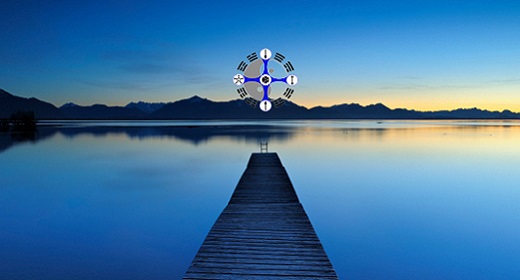by Steve Taylor PhD: We normally see time as our enemy…

We feel that it’s running way from us, bringing good experiences to an end too soon, and taking away our youth, our fitness, our good looks, and eventually even our lives themselves. We’re continually fighting against time to meet deadliness and make appointments. But since time is an ever-present factor in our lives, it’s essential for us to find a positive way of relating to it. Is it possible for us to live in harmony with time?
Throughout my life I’ve veered between two different attitudes to time, both of them positive in their different ways. These could be called the ‘positive pressure perspective’ and the ‘transcendent perspective’.
The ‘Positive Pressure Perspective’
The first perspective sees time as a precious commodity which shouldn’t be wasted. Ultimately, this is based on awareness of death. The fact that we are all going to die at some point means that our time in this life is limited. Time is slipping away from us every moment, so it’s incumbent on us to use it productively, to fulfil our potential, to achieve as much as we can, to do what we were meant to do. Life is temporary, so we should make the most of it.
This perspective can be very energising. I think of myself primarily as I writer, and I feel that there are a lot of books inside me that I have to write before I die. So sometimes when I feel a little lazy or lacking in motivation, the thought that time is limited – that I’m going to die eventually and could potentially die at any moment – can jolt me out of my indolence. ‘I haven’t got time to waste!’ I tell myself. ‘I have to get on and do what I’m meant to do!’ I already have my next three books planned out in my mind, and would be very disappointed if I ‘ran out of time’ before I was able to bring them into existence.
This view of time can be problematic though. It creates pressure, and can lead to an obsessive concern with not ‘wasting’ time. Every minute that is not deemed ‘productive’ is seen as worthless. It may mean that we’re unwilling to relax, even when we’re mentally and physically exhausted, and when we would actually become more productive if we allowed ourselves to take it easy. And more fundamentally, this attitude pre-supposes a duality between us and time. It views time as external force which we have to continually struggle against – and which will ultimately be victorious against us.
There is no Time except the Present – the ‘Transcendent Perspective’
The second perspective has a less combative attitude towards time – in fact, it doesn’t even accept its existence, at least in the normal sense. It sees linear time as a construct, a creation of the human mind (and of human culture). After all, the future is not a real phenomenon. It does not exist, except in our thoughts, in our anticipations and our plans. Similarly, the past is not a real phenomenon. All past events have faded away into non-existence. They only exist in our memory, and in the recordings we may make of them. We live our lives wholly and continually in the present. And in the present, there is no time. As a culture, we have decided to divide time into seconds, minutes, hours and days, but this has no basis in experiential terms. In the present, there is just a continual flow of experience. There are no isolated moments, or instants, there is just a flow. And we are part of the flow.
From this point of view, there is no need to worry about time passing. The present doesn’t pass away – its always with us. It stretches panoramically around us, without direction and without the divisions of different tenses.
This second attitude is obviously the healthier one. It frees from the stress and pressure of trying to keep up with time. It means that we live more naturally and authentically, in tune with our deeper impulses, doing things when we feel it’s right to do them, rather than forcing ourselves.
If there is a possible disadvantage to this ‘transcendent’ perspective of time though, it is that it may take away our sense of urgency, and reduce our motivation to complete tasks. It’s an unfortunate aspect of modern life that we often need to complete tasks and meet deadlines, but in a state of present-ness, it’s sometimes difficult to muster the self-discipline to do this. If the present is like an ocean all around us, and the future doesn’t really exist, why should we feel any sense of urgency? Why should I work hard to complete the latest chapter of my book? Why should I make an effort to meet my publisher’s deadline?
Integrating the Two Perspectives
However, I don’t think these two perspectives are necessarily incompatible. They can be integrated when we consider that, although linear time may not exist in the sense we normally think of it, duration still exists. That is, although we always live in the present, processes still take place, and those processes have a duration. They arise, they unfold and manifest themselves, and then they slowly fade away. Seconds, minutes and hours are just artificial man-made divisions, but processes such as days, months and years do exist.
And our lives are a process too. This process always takes place in the present, but we also know that it has a limited duration. Even though there is no future and no past, it’s still important for us to fulfil our potential while we can. It’s still important for us to uncover our authentic selves, to develop our skills and allow our creativity to express itself. We should still feel a sense of the brevity and fragility of the process of our lives, and feel an urgency to experience the process as fully and intensely as possible – at the same time as being aware that, as we do this, we can never be anywhere except the present.
Steve Taylor is a Senior Lecturer in Psychology at Leeds Beckett University. He is the author of Making Time.























































